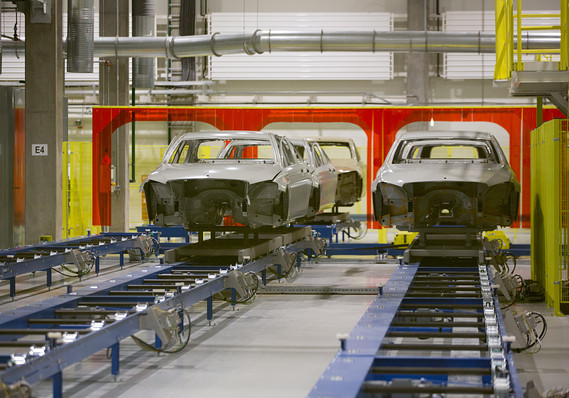 Bloomberg News/Landov
Bloomberg News/Landov
The U.S. economy is in no danger of imminent recession, but it appears to be facing tighter caps on just how fast it can grow.
Americans dialed back on spending in the first quarter, for one thing, and spring weather hasn’t done much to open their wallets and purse strings. It’s a big deal because consumers account for more than two-thirds of the activity that goes on in the economy.
Read: Trump tax cuts don’t appear to be enough as retail sales slow
Government, for its part, isn’t doing much to push growth to greater heights after a burst of spending last year.
Businesses — the third big cog in the U.S. economy — also aren’t as gung-ho as they were a year earlier. They’ve cut back on investment and are not hiring workers as fast as they were at the end of 2018.
It’s not hard to see why. A weaker global economy, a major U.S. trade dispute with China, an up-and-down stock market and the fading effects of the Trump tax cuts have worked to dampen the momentum.
What companies do from here, however, could still have a sizable impact on the economy in the months ahead and determine whether growth breaks out of its straitjacket.
What’s especially important is new investment — the key to higher productivity, rising wages and an improved standard of living for American families.
The yearly pace of investment almost came to a standstill at the end of 2018 after soaring to a six-year high of 13% in the fall of 2017, according to a closely followed measure known as core capital orders. The latest figures on investment will be released Friday as part of the April report on durable-goods orders.
Investment has partly rebounded in early 2019, climbing to a 4.6% yearly pace in March, as companies spent more on computers, software and other goods aimed at making them more efficient.
One of the chief reasons companies have boosted investment again after a lull is the nation’s 3.6% unemployment rate — the lowest in 50 years. Firms need to spend more on computers and other equipment to automate and increase production if they can’t find enough skilled workers to fill a record number of job openings.
Can it continue? That’s a critical question on which the future of the economy hinges.
The flareup in trade tensions with China and other countries have raised the cost of supplies for many companies, cut some off from key markets and disrupted global supply chains.
Read: Trump takes a page out of early American history with steep tariffs on Chinese goods
One senior executive at a U.S. energy producer told the Institute for Supply Management that tariffs and the threat of slower growth that they entail has “led my company to reduce capital spending in 2019” to 2016 levels.
It’s hard for executives to plan and invest, after all, when they don’t know what the rule are. If the dispute drags on and puts investment in a deep freeze the consequences could be far reaching.
“Animal spirits,” the unquantifiable mood swings that impact business capital spending and hiring decisions, are a key business cycle driver,” noted senior economist Avery Shenfeld of CIBC Economics. “With global growth already decelerating, it would take less of an additional shock to put the whole expansion at risk.”
The shock, as it were, would be a complete breakdown in trade talks between the U.S. and China. Yet the ramification of such a break are so high that Wall Street is still convinced the two countries will forge a deal sooner rather than later.
Investors showed their faith last week by driving up U..S. stock prices DJIA, -0.38% SPX, -0.58% , recouping much of the heavy losses after trade talks broke off without a deal.
“The most probable scenario remains a deal that ends the trade war,” said Brad McMillan, chief investment officer at Commonwealth Financial Network advisory firm. “The incentives, for both sides, are overwhelmingly in favor of a deal, in which case we should see markets recover.”
The alternative would be worse — much worse.










Add Comment